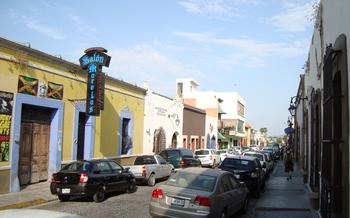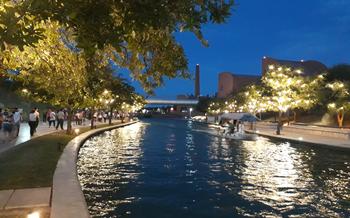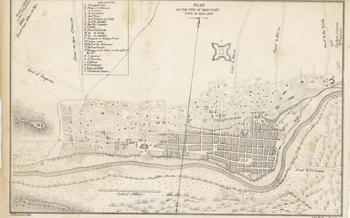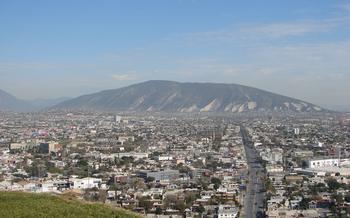
Jardín Japonés del Parque Fundidora
- The Jardín Japonés del Parque Fundidora: A Haven of Serenity in Monterrey
- Getting There: A Journey to Tranquility
- Opening Hours and Admission Fees: Planning Your Visit
- Exploring the Garden: A Walk Through Japanese Traditions
- Cultural Events and Festivals: A Celebration of Japanese Heritage
- The Garden's Flora and Fauna: A Symphony of Nature
- The Importance of Water: A Symbol of Life and Renewal
- Tea Culture and the Teahouse: A Taste of Tradition
- The Art of Bonsai: Miniature Masterpieces
- Souvenirs and Gifts: Taking a Piece of Japan Home
- Accessibility and Inclusivity: Welcoming All Visitors
- The Surrounding Area: Discovering Monterrey's Treasures
- Respecting the Garden: A Shared Responsibility
- Insider Tip: The Best Time to Visit
The Jardín Japonés del Parque Fundidora: A Haven of Serenity in Monterrey
Nestled within the vibrant city of Monterrey, the Jardín Japonés del Parque Fundidora stands as a tranquil oasis, inviting visitors to immerse themselves in the beauty and serenity of Japanese culture. This exquisite garden, inaugurated in 1992, is a testament to the deep cultural ties between Mexico and Japan. It represents a harmonious blend of traditional Japanese aesthetics with the natural splendor of Monterrey, providing a sanctuary for reflection, relaxation, and appreciation of nature.
The Jardín Japonés is a labor of love created by a team of renowned Japanese landscape architects who meticulously designed every element to reflect the essence of Japanese garden art. From the meticulously manicured lawns and vibrant cherry blossoms to the serene koi ponds and tranquil waterfalls, the garden is a living masterpiece that embodies the principles of simplicity, balance, and harmony.
Beyond its aesthetic appeal, the Jardín Japonés serves as a symbol of friendship and cultural exchange between Mexico and Japan. It represents the shared values of respect for nature, appreciation for beauty, and the pursuit of inner peace. The garden has become an integral part of Monterrey's cultural landscape, attracting both locals and tourists who seek solace, inspiration, and a glimpse into the rich traditions of Japan.
Getting There: A Journey to Tranquility
Situated in the heart of Monterrey, the Jardín Japonés del Parque Fundidora is conveniently accessible by various means of transportation. For those relying on public transport, the Fundidora Metro Station is just a short walk away, connecting visitors to the city's extensive metro network. Alternatively, numerous bus lines have stops near the park, making it easy to reach from different parts of the city.
For those who prefer the convenience of driving, the park offers ample parking facilities. The designated parking lots are located within walking distance of the garden's entrance, ensuring a hassle-free arrival. Whether you choose to take public transportation or drive, the Jardín Japonés del Parque Fundidora is easily accessible, inviting you on a journey to tranquility amidst the bustling city.
Here are a few additional tips for a smooth and enjoyable journey:
- Plan your route in advance to avoid getting lost or wasting time.
- Arrive early, especially on weekends or during special events, to beat the crowds and fully immerse yourself in the garden's serenity.
- Consider using a ride-sharing app or taxi if you don't have access to a car or prefer not to drive.
Opening Hours and Admission Fees: Planning Your Visit
The Jardín Japonés del Parque Fundidora welcomes visitors from Tuesday to Sunday, inviting them to immerse themselves in the serene beauty of Japanese culture. The garden's doors open at 9:00 AM, allowing ample time to explore its tranquil paths and captivating landscapes. It closes at 6:00 PM, ensuring a leisurely visit that allows you to soak in the essence of this serene oasis.
Admission fees are structured to encourage accessibility while supporting the garden's maintenance and preservation efforts. The standard admission rate for adults is [amount], while discounted rates are available for students, seniors, and children. Every Tuesday, the garden offers free admission to all visitors, providing an excellent opportunity to experience its charms without any financial barriers. Special events and festivals held throughout the year may have additional fees or require advance registration.
Consider purchasing tickets in advance to avoid queues and ensure a smooth entry, especially during peak tourist seasons or special events. Online ticketing options are available on the garden's official website, offering convenience and peace of mind.
Exploring the Garden: A Walk Through Japanese Traditions
Strolling through the Jardín Japonés del Parque Fundidora is like embarking on a journey through the heart of Japanese culture and traditions. The garden's layout is carefully designed to evoke a sense of tranquility and harmony, with winding paths that lead visitors through different sections, each showcasing unique elements of Japanese garden design.
One of the highlights of the garden is the koi pond, home to hundreds of brightly colored koi fish. Visitors can marvel at the graceful movements of these fish as they glide through the water, creating a serene and mesmerizing spectacle. The pond is surrounded by lush greenery and traditional Japanese lanterns, adding to the tranquil ambiance.
Bridges are another essential feature of the garden, serving both a functional and symbolic purpose. The arched bridges, made of wood or stone, allow visitors to cross over the ponds and streams, while also representing the transition from one realm to another. The bridges are often adorned with intricate carvings or railings, which add a touch of elegance to the garden.
Teahouses, or chashitsu, are an integral part of Japanese culture and can be found within the Jardín Japonés. These traditional buildings are designed for the tea ceremony, a ritualized form of tea preparation and drinking that holds deep cultural and philosophical significance in Japan. Visitors can observe tea ceremony demonstrations or even participate in a workshop to learn more about this ancient tradition.
Cultural Events and Festivals: A Celebration of Japanese Heritage
The Jardín Japonés del Parque Fundidora is not just a serene retreat but also a vibrant cultural hub that hosts a variety of events and festivals throughout the year, offering visitors a chance to immerse themselves in Japanese traditions.
Regular events include tea ceremonies, Ikebana (flower arrangement) workshops, and traditional dance and music performances. These events showcase the beauty and diversity of Japanese culture, allowing visitors to witness the skills and artistry of Japanese performers up close.
Seasonal festivals, such as the cherry blossom viewing (Hanami) in spring and the autumn leaves viewing (Momiji) in fall, are particularly popular. During these festivals, the garden transforms into a sea of pink and red blossoms or a kaleidoscope of vibrant autumn colors, attracting visitors from near and far.
For a truly immersive experience, visitors can participate in hands-on workshops, where they can learn the art of origami, calligraphy, or even try their hand at traditional Japanese cooking. These workshops provide a unique opportunity to connect with Japanese culture on a deeper level.
Insider tip: To make the most of your visit during festivals, arrive early to avoid crowds and secure a good spot for viewing performances or taking photos. Also, be sure to check the garden's website or social media pages for the latest event schedule and updates.
The Garden's Flora and Fauna: A Symphony of Nature
The Jardín Japonés del Parque Fundidora boasts a diverse array of plants and trees, creating a serene and harmonious environment. Visitors can admire the delicate beauty of cherry blossoms in spring, the vibrant hues of maple leaves in autumn, and the lush greenery of bamboo groves throughout the year. Native and exotic species coexist peacefully, adding to the garden's charm and biodiversity.
Koi fish, with their vibrant colors and graceful movements, glide through the tranquil ponds, symbolizing good luck and prosperity. Turtles bask in the sun on rocks, adding a touch of whimsy to the landscape. Migratory birds, attracted by the garden's serene atmosphere, often stop to rest and feed, creating a symphony of chirping and fluttering wings.
Respecting the natural environment is of utmost importance in Japanese culture. Visitors are encouraged to admire the wildlife from a distance, avoiding any disturbance or interaction. The garden's serene atmosphere provides a sanctuary for both plants and animals, allowing visitors to connect with nature and appreciate its beauty.
The Importance of Water: A Symbol of Life and Renewal
In Japanese garden design, water holds a profound significance, symbolizing purity, tranquility, and the cyclical nature of life and renewal. The Jardín Japonés del Parque Fundidora embodies this philosophy with its intricate network of ponds, waterfalls, and streams. These water features serve as focal points, drawing the eye and creating a sense of serenity.
The central pond, known as the koi pond, is a microcosm of the garden's philosophy. The gentle ripples of the water's surface mimic the flow of time, while the graceful koi fish represent perseverance and good fortune. The sound of water trickling down the waterfalls adds to the ambiance, creating a soothing and meditative atmosphere.
In Japanese culture, water is associated with purification rituals and is believed to possess spiritual qualities. The garden's water features thus invite visitors to pause, reflect, and connect with the natural world. By incorporating water into the garden's design, the creators have paid homage to this essential element and its profound symbolism.
Tea Culture and the Teahouse: A Taste of Tradition
Tea plays a pivotal role in Japanese culture, symbolizing purity, tranquility, and harmony. The Jardín Japonés del Parque Fundidora houses a traditional teahouse, inviting visitors to immerse themselves in this ancient tradition. The teahouse exudes an aura of serenity, featuring tatami mats, low tables, and traditional Japanese decor.
Tea ceremony demonstrations are regularly held within the teahouse, providing visitors with a glimpse into this intricate ritual. These demonstrations showcase the meticulous preparation and serving of matcha tea, accompanied by explanations of the underlying philosophy and symbolism. Workshops are also offered for those who wish to learn more about the art of tea and experience it firsthand.
Respecting the etiquette of the tea ceremony is essential. Visitors are expected to remove their shoes before entering the teahouse, bow to show respect, and maintain silence during the ceremony. This etiquette reflects the deeply ingrained values of humility, mindfulness, and appreciation in Japanese culture.
The Art of Bonsai: Miniature Masterpieces
Bonsai, the ancient Japanese art of cultivating miniature trees in containers, finds a home in the Jardín Japonés del Parque Fundidora. These miniature masterpieces symbolize balance, harmony, and the cycle of life.
The garden's bonsai collection showcases various styles and techniques, including the formal upright, informal upright, slanting, cascade, and semi-cascade styles. Each style represents a different aesthetic and philosophy, embodying the essence of nature in its miniaturized form.
Visitors can observe the intricate techniques used to shape, prune, and wire the trees, creating living sculptures that mimic the grandeur of full-sized trees. The art of bonsai is a testament to the Japanese reverence for nature and the belief that even the smallest elements can possess great beauty and significance.
When admiring the bonsai collection, take note of the symbolism and philosophy behind each tree. Some bonsai represent strength and resilience, while others convey a sense of tranquility and serenity. Each tree tells a unique story, inviting visitors to contemplate the interconnectedness of all living things.
To fully appreciate the art of bonsai, consider joining a guided tour or workshop. These sessions provide insights into the history, techniques, and symbolism of bonsai, allowing visitors to delve deeper into this fascinating tradition.
Souvenirs and Gifts: Taking a Piece of Japan Home
As you depart from the serene embrace of the Jardín Japonés, don't forget to take a piece of its magic with you. The gift shop, nestled within the garden's tranquil haven, offers a treasure trove of traditional Japanese souvenirs, crafts, and snacks.
Immerse yourself in the exquisite craftsmanship of Japanese ceramics, adorned with intricate patterns and vibrant hues. Choose from a range of delicate teacups, elegant vases, and decorative plates that will bring a touch of Japanese artistry to your home.
Indulge your senses with authentic Japanese snacks and sweets. Sample the delicate flavors of mochi, soft and chewy rice cakes filled with sweet red bean paste, or savor the crispy crunch of tempura, deep-fried seafood and vegetables.
For those seeking unique keepsakes, the gift shop offers a selection of items inspired by the garden's design and culture. Find postcards and prints featuring stunning photographs of the garden's landscapes, or choose from a range of souvenirs adorned with the garden's logo or traditional Japanese motifs.
Whether you're searching for a gift for a loved one or a memento for yourself, the Jardín Japonés gift shop promises an authentic and memorable experience.
Accessibility and Inclusivity: Welcoming All Visitors
The Jardín Japonés del Parque Fundidora is dedicated to creating a welcoming and inclusive environment for all visitors. Accessibility features like ramps, elevators, and designated parking spaces ensure that everyone can comfortably navigate the garden's pathways and attractions. The garden's staff is also trained to assist visitors with disabilities and provide any necessary accommodations.
For those with visual impairments, audio guides and tactile maps are available to enhance their experience. The garden's signage is also written in both Spanish and English to accommodate visitors from different language backgrounds.
The Jardín Japonés is more than just a beautiful garden; it's a place where everyone can find peace, tranquility, and a connection to nature. Its commitment to accessibility and inclusivity ensures that all visitors, regardless of their abilities, can enjoy and appreciate its serene beauty.
Tips for ensuring a comfortable and enjoyable visit for all:
- Plan your visit in advance and inform the garden staff about any specific accessibility needs.
- Take advantage of the available accessibility features like ramps, elevators, and designated parking.
- If you have any questions or require assistance, don't hesitate to approach the garden's staff.
- Be mindful of other visitors and respect their personal space.
- Follow the park rules and regulations to ensure a safe and enjoyable experience for everyone.
The Surrounding Area: Discovering Monterrey's Treasures
The Jardín Japonés del Parque Fundidora is ideally located, making it easy for visitors to explore the surrounding area and discover the many treasures that Monterrey has to offer. Within walking distance of the park, visitors can find the Museo de Historia Mexicana, which houses a vast collection of artifacts and exhibits showcasing the rich history of Mexico. For those interested in contemporary art, the Museo de Arte Contemporáneo de Monterrey (MARCO) is a must-visit, showcasing works by renowned Mexican and international artists.
Just a short drive from the park, visitors can explore the stunning Grutas de García, an extensive cave system with breathtaking stalactite and stalagmite formations. For those seeking outdoor adventures, the Parque Ecológico Chipinque offers hiking trails, mountain biking, and breathtaking views of the city and the Sierra Madre Oriental mountains.
When it comes to dining, Monterrey's culinary scene is diverse and vibrant. In the vicinity of the park, visitors can indulge in delicious traditional Mexican cuisine at local restaurants, or savor international flavors at one of the many trendy eateries. For a unique dining experience, visitors can head to the nearby Barrio Antiguo, Monterrey's historic center, which offers a variety of restaurants, bars, and cafes housed in charming colonial buildings.
By combining a visit to the Jardín Japonés del Parque Fundidora with these surrounding attractions, visitors can create a comprehensive itinerary that showcases the cultural, historical, and culinary delights of Monterrey, ensuring a truly memorable and enriching travel experience.
Respecting the Garden: A Shared Responsibility
The Jardín Japonés del Parque Fundidora, like any public space, thrives on the collective responsibility of its visitors to maintain its tranquility and beauty. As you embark on your journey through the garden, remember to adhere to the park's rules and regulations. These guidelines are in place to ensure a harmonious and enjoyable experience for all visitors.
Respect the peace and serenity of the garden by keeping your voice low and avoiding loud noises. Allow the tranquil ambiance to envelop you as you immerse yourself in the garden's serene atmosphere.
Follow designated pathways and refrain from venturing into restricted areas. The garden's layout has been carefully designed to preserve the delicate balance of its natural elements.
Respect the plants and wildlife that call the garden home. Refrain from picking flowers or disturbing the wildlife, allowing them to flourish in their natural habitat.
Dispose of waste responsibly by using designated trash bins. Help keep the garden clean and pristine for everyone to enjoy.
Be mindful of your fellow visitors, especially those seeking a moment of contemplation or solitude. Allow them to immerse themselves in the garden's tranquility without disruptions.
By following these simple guidelines, you become an integral part of preserving the Jardín Japonés del Parque Fundidora for generations to come. Together, we can ensure that this haven of tranquility remains a cherished destination for all who seek solace, beauty, and a connection to Japanese culture in the heart of Monterrey.
Insider Tip: The Best Time to Visit
Timing is everything when it comes to experiencing the Jardín Japonés del Parque Fundidora to its fullest. While the garden is open throughout the year, certain times offer a truly exceptional experience.
For a tranquil and serene visit, aim to arrive early in the morning before the crowds. The garden awakens with a magical aura as the sun's golden rays illuminate the glistening koi ponds and cast long shadows across the manicured lawns. This peaceful ambiance is perfect for quiet contemplation and capturing stunning photographs without distractions.
If you seek a more vibrant experience, plan your visit during special events and festivals held throughout the year. These events showcase Japanese culture in all its glory, with traditional performances, workshops, and exhibitions. The cherry blossom viewing in spring and autumn leaves viewing in fall are particularly popular, attracting visitors from far and wide.
No matter when you choose to visit, the Jardín Japonés del Parque Fundidora offers a unique and immersive experience that will transport you to the heart of Japanese tradition and serenity.









